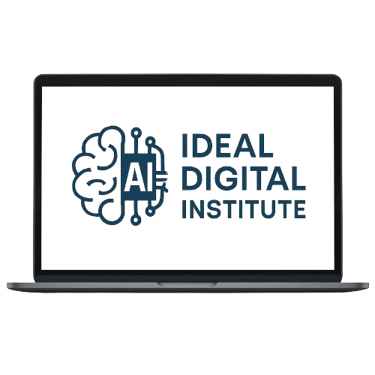Learn. Build. Succeed — Your Career Starts at Ideal Digital Institute.
AI Agent Development - Bootcamp
Duration: 1 Month (12 Lectures – 3 per week)
Mode: Hands-on, Instructor-Led
Level: Beginner to Advanced
Mode: Online
Fee: Rs. 5,000/-
Course Overview
This intensive crash course is designed to take you from the fundamentals of AI agents to building advanced, autonomous, and multi-agent systems using Google’s Agent Development Kit (ADK). With a strong balance of theory and hands-on coding, you’ll learn how to design, build, and deploy intelligent agents for real-world applications.
Course Schedule
Week 1 – Foundations of Agent Development
Lecture 1 – Introduction to AI Agents Setup
What are AI Agents? Core principles of perception, reasoning, and action
Introduction to the Google ADK (architecture & workflow)
Environment setup and first agent demonstration
Lecture 2 – Building Your First Agent
Understanding the agent lifecycle
Designing inputs, prompts, and outputs
Extending a simple agent to handle multiple queries
Lecture 3 – Tool-Enhanced Agents
Why agents need tools and external integrations
Adding tools to extend agent capabilities
Practical example: connecting an agent to a custom tool (e.g., weather, calculator)
Week 2 – Enhancing Agent Intelligence
Lecture 4 – Integrating Multiple LLMs
Why use LiteLLM for flexibility
Switching between different LLM providers (OpenAI, Anthropic, etc.)
Comparing performance and accuracy across models
Lecture 5 – Structured Outputs
The importance of structured responses in production
Enforcing JSON and schema-based outputs
Hands-on example: agents returning validated data
Lecture 6 – Sessions & State Management
How agents maintain context across conversations
Short-term vs. long-term memory design
Building agents that adapt to user preferences
Week 3 – Memory Collaboration
Lecture 7 – Persistent Storage
Persisting conversations with databases or files
Trade-offs: performance vs. memory size
Real-world example: storing and retrieving chat history
Lecture 8 – Multi-Agent Systems
Why multi-agent collaboration matters
Designing specialized agents that work together
Example: researcher agent + summarizer agent collaboration
Lecture 9 – Stateful Multi-Agent Systems
Combining state management with multi-agent collaboration
Handling complex workflows across multiple agents
Example: a travel booking system with planner, budget, and confirmation agents
Week 4 – Advanced Workflows, Capstone
Lecture 10 – Callbacks Monitoring
Tracking the lifecycle of agent actions
Debugging and monitoring with callbacks
Implementing logging and usage metrics
Lecture 11 – Sequential, Parallel Workflows
Sequential task pipelines vs. parallel task execution
When to use each for efficiency and accuracy
Real-world scenarios where hybrid workflows shine
Lecture 12 – Autonomous Agents, Capstone Project
Autonomous agent loops
Safety considerations and guardrails for autonomous systems
Capstone Project: Build a fully functional autonomous agent system
Features: persistent memory, structured outputs, tool integration
Example use case: a news summarizer with fact-checking and storage
Learning Outcomes
By the end of this course, you will be able to:
✔️ Understand AI agent fundamentals and ADK architecture
✔️ Build and extend agents with tools, memory, and persistence
✔️ Design multi-agent collaborative systems
✔️ Implement monitoring, debugging, and optimization strategies
✔️ Create safe and autonomous agents for real-world applications
Address
Techsolab Pvt. Ltd. House # 446-A, Park Lane # 06, Stadium Double Road, Rawalpindi
admission@idealdigitalinstitute.com
03483096416 / 03555463605
© 2025. All rights reserved.
Contact Us
Quick Registration
Account Details:
Bank Islami
Muhammad Jahangir
310300004180190
Easypaisa
Muhammad Jahangir
03468483372
